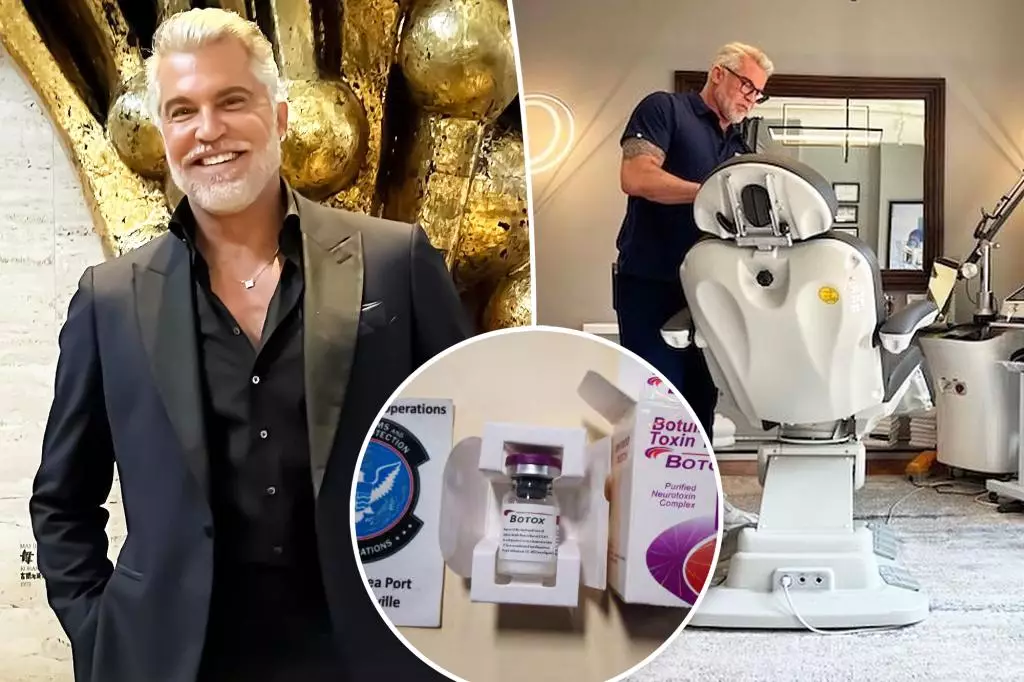In a world that prioritizes appearance and self-image, the pursuit of beauty often drives individuals to seek various cosmetic procedures. This quest can lead to dangerous situations, especially when trust is compromised. A recent revelation surrounding aesthetician Joey Grant Luther has sent shockwaves through the beauty community, particularly within the LGBTQ+ circles that he frequented. Allegations of injecting counterfeit Botox, with serious side effects, have surfaced, igniting outrage and concerns about safety within the aesthetic profession.
Luther’s clients repeatedly expressed their shock upon learning of his dubious practices. Despite being an aesthetician, Luther lacked the necessary authorization to administer Botox, a fact that remained obscured to many of his clients. One former client shared a harrowing experience: after receiving treatment, they suffered from debilitating double vision and underwent extensive medical tests, including CAT scans and MRIs, only to find the true cause of their ailment was Luther’s counterfeit product. The consequences were not only physical but financial, leading to a sense of betrayal and frustration when the supposed professional went silent after the treatment.
The fallout from Luther’s actions transcends personal distress—it has woven itself into the fabric of the community that once celebrated him. Many are left grappling with the deeper implications of misplaced faith in a professional who offered low prices for procedures deemed necessary for their self-esteem. The ease of access to affordable treatments can mask significant risks, as highlighted by another former client who noted the attractive rates Luther provided, which felt like a bargain compared to industry standards.
The case against Luther has revealed the unsettling truth about counterfeit products in the aesthetic market. The U.S. Attorney’s Office indicated that Luther was charged with multiple offenses, including wire fraud and the distribution of misbranded drugs, emphasizing that the products he utilized were knowingly harmful. The potential damage caused to his clients—not just in terms of health but also the emotional toll—cannot be overstated.
One victim’s experience was particularly alarming; after treatment, they were diagnosed with botulism toxin, suffering from severe symptoms including difficulty in swallowing, slurred speech, and profound muscle weakness. Such serious consequences illuminate the dark side of a seemingly innocuous procedure. It raises the vital question: how can consumers protect themselves in a landscape where providers like Luther masquerade as legitimate practitioners?
The implications of this scandal stretch beyond individual experiences; they ripple through the broader beauty and wellness community. Luther’s arrest has caused an upheaval, particularly among the gay community, where he had built a loyal client base based on charm and personal connection. The feeling of betrayal is palpable as customers come to terms with the risks they unwittingly embraced. The comment from one former client resonates deeply—”Who do you trust these days?” This sentiment captures the vulnerabilities faced by consumers navigating the complex world of aesthetic treatments.
In an increasingly digitized and image-obsessed era, where social media platforms celebrate curated beauty, the need for credible and straightforward information about aesthetic procedures is critical. Clients must be empowered to ask the right questions and verify the credentials of those they trust with their health and appearance.
As the industry grapples with the implications of the Luther case, it serves as a clarion call for stricter regulations and more transparent practices. The beauty industry must advocate for clear standards and robust enforcement to protect consumers against unqualified practitioners. A movement towards ensuring that all aesthetic procedures are performed by licensed professionals is essential to restoring trust and safety.
The troubling events surrounding Joey Luther’s practices lay bare the vulnerabilities in the cosmetic industry. It serves as a reminder that the allure of cheap and easy beauty can lead to significant, sometimes dire, consequences. Clients must be vigilant and demand accountability, ensuring that their pursuit of beauty does not compromise their health or well-being. The journey to reclaim trust in this vital industry requires collective responsibility and, more importantly, an unwavering commitment to truth and safety.

